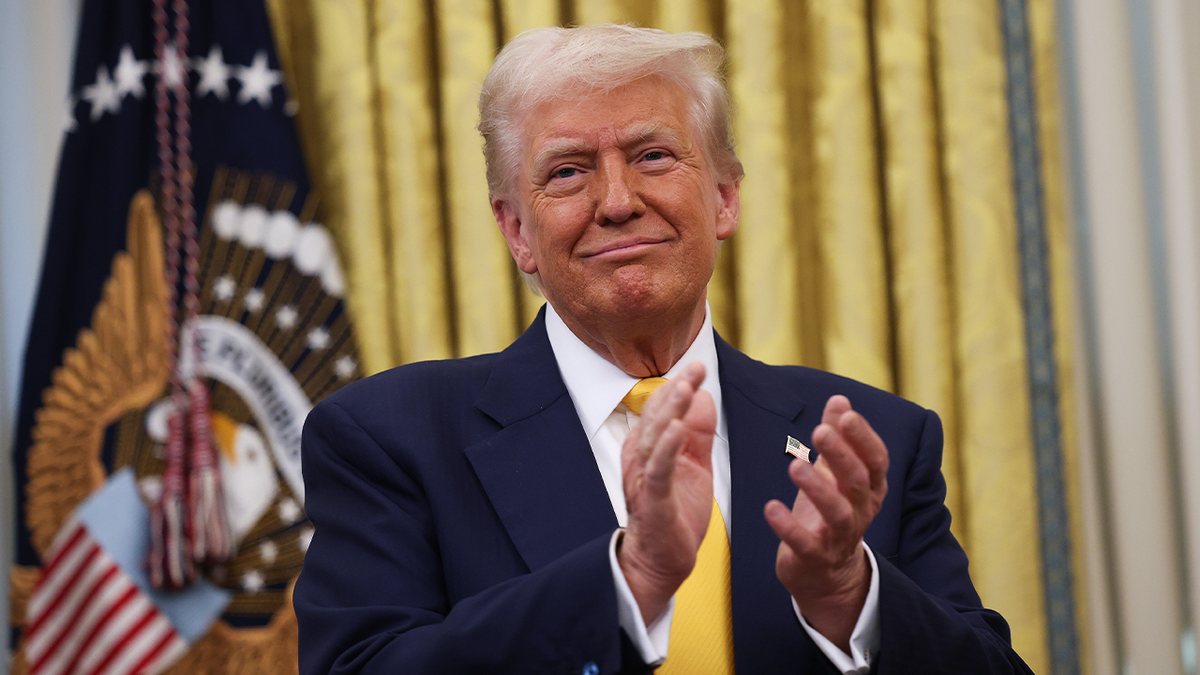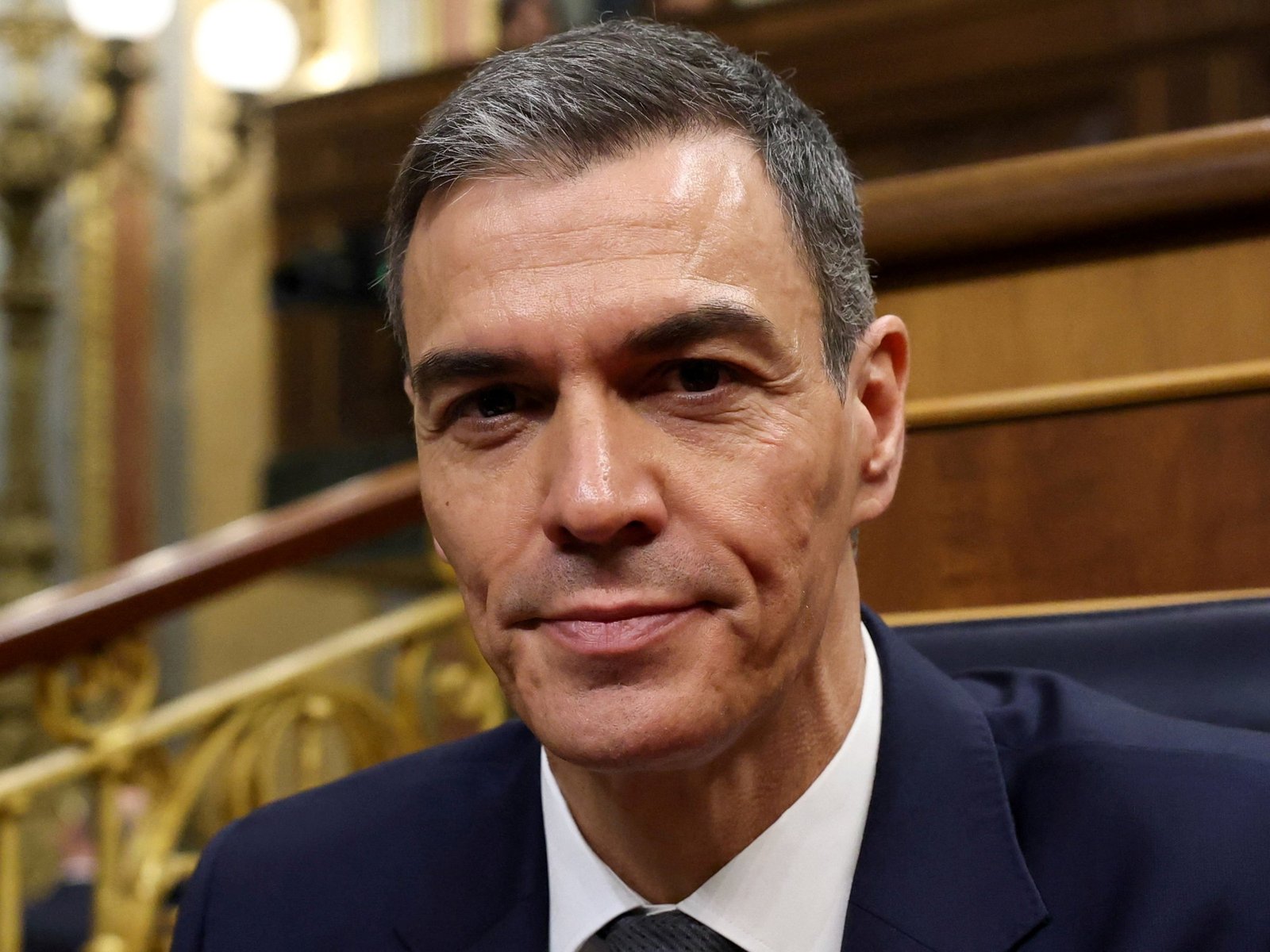INTERNACIONAL
Senate approves Peter Hoekstra as next US ambassador to Canada

Canada has a new U.S. ambassador to sort through its strained relations with Washington as the Senate on Wednesday approved President Donald Trump’s nomination of Peter Hoekstra in a 60-37 vote.
His confirmation as U.S. ambassador to Canada comes at one of the most challenging times in Washington’s long relationship with its northern neighbor after Trump launched a series of tariffs targeting Ottawa and repeatedly claimed he believes Canada should become the U.S.’s 51st state.
But despite heightened concerns over Trump’s ambitions for Canada, particularly among Democratic lawmakers, Hoekstra’s Senate confirmation process was a relatively smooth road.
TRUMP PICKS FORMER CONGRESSMAN PETE HOEKSTRA TO BE AMBASSADOR TO CANADA
Peter Hoekstra, President Trump’s nominee for U.S. ambassador to Canada, attends his Senate Foreign Relations Committee hearing on trade, security and other U.S. interests. (Anna Moneymaker/Getty Images)
«I do have a special appreciation for Canada as a neighbor,» he told senators at his confirmation hearing last month.
Following questions from Delaware Democrat Sen. Christopher Coons, Hoekstra affirmed that «Canada is a sovereign state.»
However, he declined to comment on the president’s repeated desire to incorporate Canada as the next U.S. state – a proposal Ottawa has consistently rejected.
«How the president and the relationship between the former prime minister in Canada and the characteristics, the nature of that relationship… I don’t know,» he added.
The Michigan lawmaker and former ambassador to the Netherlands during President Trump’s first term referenced his state’s close ties to Canada during his opening remarks last month before the Senate Foreign Relations Committee.
«My home state is connected to Canada by four and soon to be five, bridge crossings along maritime board, across the Great Lakes, vital lakes that drive businesses, jobs and livelihoods in both states,» Hoekstra highlighted. «If confirmed, I will work tirelessly to build on that record of cooperation extended, obviously nationally.»
CANADA STARES DOWN CONSEQUENCES OF TRUMP TARIFF WAR: JOB LOSSES, GROCERY PRICE HIKES, POSSIBLE RECESSION

A truck with vehicles crosses the Blue Water Bridge border into the United States from Sarnia, Canada on April 3, 2025. (Geoff Robins/AFP via Getty Images)
Canada is the U.S.’s largest trading partner and the number one purchaser of U.S. goods.
«I think there’s 36 states that see Canada as their number one trading partner internationally,» Hoekstra confirmed.
The U.S. is also, by far, Canada’s largest trading partner and top purchaser of Canadian goods, but Trump has repeatedly called the relationship «unfair.»
In 2023, the U.S. imported some $443 billion worth of goods, accounting for 72% of all Canadian exports, while Canada imported $317 billion U.S. goods, accounting for 49% of Ottawa’s total imports.
TRUMP SAYS CANADA WOULD HAVE NO TARIFFS AS 51ST STATE, AS OBSERVERS BRACE FOR TRADE WAR

Trump applauds after Howard Lutnick was sworn in as U.S. commerce secretary in the Oval Office at the White House on Feb. 21, 2025. (Win McNamee/Getty Images)
CLICK HERE TO GET THE FOX NEWS APP
In response, Trump slapped Ottawa with a blanket 25% tariff on all Canadian imports in a move to dissuade American consumers from purchasing Canadian goods, with the exception of energy imports, which saw a 10% tariff.
Additionally, Trump announced a 25% tariff on all imported vehicles and parts, which will also drastically affect Canada as automobiles are a chief export item to the U.S.
INTERNACIONAL
La vieja gurú de las inversiones de Uruguay, acusada de estafar a sus clientes, busca llegar a un acuerdo para evitar la cárcel

Sara Goldring fue la primera mujer en entrar a la Bolsa de Valores de Montevideo (BVM), ubicada en el casco histórico de la capital de Uruguay. Viajaba dos veces por año para formarse en Estados Unidos y se convirtió en una gurú de las finanzas, que sabía todos los secretos del mundo de los negocios. A muchos de los que confiaban sus ahorros en ella les hizo ganar fortunas, de acuerdo a un perfil de esta empresaria publicado por El Observador.
Goldring sabía que, por ejemplo, cuando los operadores bursátiles de Wall Street se iban a almorzar era el momento de comprar. Ella estaba horas monitoreando en su mesa seis pantallas de Bloomberg con los precios de las principales acciones. Almorzaba en su escritorio. No quería perderse el minuto a minuto.
Desde ese lugar Goldring también vio cómo se derrumbó.

Goldring pasó de ser la “diosa” –en sus propias palabras– a ser una diabla que ahora enfrenta una pena de prisión de cuatro años acusada de estafar a sus clientes, de acuerdo al pedido del fiscal Enrique Rodríguez. Y también busca llegar a un acuerdo con ellos.
La corredora de bolsa uruguaya –que estaba al frente de Custodia Valores Mobiliarios (CVM)– vio cómo el saldo en las cuentas de sus clientes se desplomaba y decidió esconder esa información. Fue en 2022 que la empresa informó que enfrentaba pérdidas millonarias y una investigación reveló que utilizaba fondos de algunos inversores para compensar las pérdidas de otros.
De acuerdo a su versión, la desvalorización estaba explicada por la debacle que tuvieron durante la pandemia las acciones de empresas que cotizaban en Nasdaq. Y el ocultamiento de esta información llevaron a que Goldring esté imputada por apropiación indebida y ahora deba enfrentar la máxima pena para este delito.

Para el fiscal que sigue el caso, la corredora se apropió de forma indebida de USD 21 millones que pertenecían a los ahorristas.
¿Cómo fue la maniobra? La corredora se amparó en el mandato de libre administración que le habían dado los clientes para vender opciones de put para la cartera de clientes que tenían un perfil agresivo. En los bancos del exterior operaba a través de la modalidad de “cuenta ómnibus” –de varios clientes–, una práctica habitual en el mercado.
La venta de puts es una operación que implica que el comprador adquiere el derecho pero no la obligación de vender un activo, que en este caso eran acciones de empresas que cotizan en bolsas de Estados Unidos. Se trata de una operación que implica un riesgo alto porque, si bien pueden generar importantes beneficios, si el precio de las acciones baja más allá del valor acordado previamente pueden haber grandes pérdidas.
Según el relato del fiscal, los clientes que tenían posiciones en la cuenta ómnibus y que no habían invertido en operaciones put, vieron afectados sus valores porque fueron utilizados “en forma indebida e inconsulta por la acusada para solventar las pérdidas sufridas por los clientes”.
CVM tenía unos 479 clientes, de los cuales unos 120 tenían un perfil inversor moderado y otros cinco un perfil conservador, informó El Observador. Había uno que no había definido su perfil y otros 353 que tenían un perfil agresivo. Algunos pocos clientes tenían fondo de USD 1 millón a USD 2 millones en su cuentas y había otros pocos con USD 50 mil. Pero la media estaba entre los USD 100.000 y los USD 300.000.
Tras la acusación del fiscal Rodríguez, la ahora ex corredora de bolsa busca dar por cerrado el tema e intenta acordar con los damnificados para devolverles un 60% del total de los activos que les pertenecían.
La propuesta cuenta con el visto bueno de la Liga de Defensa Comercial –la interventora de la empresa–, al tiempo que algunos de los damnificados ya han adherido al acuerdo. Otro grupo de inversores se niega por completo. Los plazos originales que había establecido la interventora vencieron, pero aún se está a tiempo de cerrar un acuerdo porque se desconoce cuándo empezará el juicio oral.
Hasta ahora se ha alcanzado el 60% de las firmas y se requiere una mayoría del 75% de los créditos reconocidos para dar por cerrado el acuerdo. Con esto, el juicio penal se cerraría.
De acuerdo a la versión del medio uruguayo, los inversores que se oponen al acuerdo entienden que esta propuesta solo beneficia a Goldring, que tiene un patrimonio millonario. Pero los cercanos a la vieja corredora señalan que tiene 76 años y que su reputación ya fue dañada.
Los allegados a Goldring estiman que se llegará a cubrir unos USD 13 millones de los USD 21,8 millones de deuda estimada total.
El acuerdo propuesto señala: “Se ofrece asimismo el efectivo propiedad de CVM que resulte una vez cubiertos los pasivos y pagos pendientes (despidos, honorarios, etc), los saldos positivos que surjan concluidos los juicios y abonado el pasivo de United Brokers SA, la otra sociedad propiedad de Goldring, que operaba en zona franca, así como la venta de bienes”.
Pero hay un grupo de damnificados que asegura que se les debe unos USD 100 millones y tienen la esperanza de que en Estados Unidos haya cuentas con más dinero.
gente
INTERNACIONAL
Kavanaugh rips Supreme Court majority’s ‘illogical’ line on tariffs

NEWYou can now listen to Fox News articles!
Justice Brett Kavanaugh called the Supreme Court’s decision striking down Trump’s emergency tariffs «illogical» in a fiery dissent on Friday and offered a roadmap of alternatives for Trump to attempt to carry out his signature economic policy.
Kavanaugh, a Trump appointee, said the 6-3 majority cherry-picked ways in which Trump could regulate imports under the International Emergency Economic Powers Act, making what he said was a textualist case that the law already allows similar forms of regulation on imports, including quotas and embargoes. Tariffs are not just in the same category as those but are a «far more modest» alternative to them, Kavanaugh said.
«If quotas and embargoes are a means to regulate importation, how are tariffs not a means to regulate importation? Nothing in the text supports such an illogical distinction,» Kavanaugh wrote.
Trump last year bypassed Congress and unilaterally levied tariffs on nearly every country in the world by invoking the IEEPA. The president argued that an influx of illicit drugs from China, Mexico and Canada and a trade deficit that has decimated American manufacturing constituted emergencies that justified the tariffs.
SUPREME COURT BLOCKS TRUMP’S TARIFFS IN MAJOR TEST OF EXECUTIVE POWER
Justice Brett Kavanaugh dissented in a pivotal Supreme Court decision striking down Trump’s emergency tariffs. (AP Photo/Susan Walsh, File)
The majority held in a 6-3 opinion that while IEEPA allows a president to «regulate importation» during a declared national emergency, the statute does not clearly authorize tariffs, a core congressional taxing power. Chief Justice John Roberts wrote that when executive action carries sweeping economic consequences, Congress must weigh in on the matter with unmistakable clarity, alluding to what is known as the major questions doctrine.
Kavanaugh said the Supreme Court’s decision in 2022 upholding a vaccine mandate former President Joe Biden imposed on millions of healthcare workers «strongly supports» upholding Trump’s tariffs. Like tariffs, that executive action also carried major consequences even though Congress did not explicitly mention vaccines in the health and safety statute Biden used to justify his mandate, Kavanaugh said.
In oral arguments in November, Solicitor General John Sauer, appearing on behalf of the government, said tariffs were an invaluable way for Trump to negotiate with foreign partners. Weakening his «suite of tools» by removing tariffs from it was a «bit unusual,» Sauer said.
Sauer also said tariffs were the same as embargoes, which block imports altogether. The solicitor general conceded, though, that tariffs had the «incidental and collateral effect» of raising revenue, but he said their primary purpose was to regulate rather than collect income. Kavanaugh agreed.
«As the [majority of justices] interpret the statute, the President could, for example, block all imports from China but cannot order even a $1 tariff on goods imported from China,» Kavanaugh wrote.
AS TRUMP TOUTS TARIFF WINDFALL, BATTLEGROUND STATES SHOULDER BILLIONS IN COSTS

The Supreme Court building in Washington, D.C. (AP/Jon Elswick)
Kavanaugh referenced numerous other statutes he said Trump had in his toolbox, mapping out alternatives in the wake of the high court nixing IEEPA as an option. Kavanaugh said the majority «in essence» concluded that Trump «checked the wrong statutory box.»
Trump, in a speech remarking on the decision, praised Kavanaugh for «his genius and his great ability,» adding he was «very proud of that appointment.»
The president referenced a quote from Kavanaugh’s dissent, saying, «‘Although I firmly disagree with the court’s holding today, the decision might not substantially constrain a president’s ability to order tariffs going forward.’ So think of that … and it doesn’t. He’s right.
«We have very powerful alternatives.»
Kavanaugh also raised a glaring question left unaddressed by the high court’s majority of how the U.S. Treasury could go about refunding companies to the tune of billions of dollars that the government gained from the unlawful tariffs.
JONATHAN TURLEY: SUPREME COURT RULING ON TRUMP TARIFFS COMES DOWN TO A NUMBERS GAME

President Donald Trump shows off non-reciprocal tariff examples. (Mandel Ngan/Getty Images)
Kavanaugh said of the «serious practical consequences» of outlawing Trump’s ability to use IEEPA to levy tariffs that the refund process could be a «mess» as lower courts are likely to see an influx of lawsuits from business owners looking for their money back.
«The United States may be required to refund billions of dollars to importers who paid the IEEPA tariffs, even though some importers may have already passed on costs to consumers or others,» Kavanaugh wrote. «As was acknowledged at oral argument, the refund process is likely to be a ‘mess.’»
CLICK HERE TO DOWNLOAD THE FOX NEWS APP
The majority opinion, authored by Roberts, found that IEEPA’s language allowing a president to regulate imports intentionally omits the word «tariff.»
Roberts wrote that the other words in the statute «cannot bear» the same weight as the word tariff, which he said operates like a tax because it allows the government to collect revenue, which he said only Congress can authorize.
Justices Samuel Alito and Clarence Thomas joined Kavanaugh’s dissent, and Thomas also wrote a separate dissent.
supreme court,donald trump,economy,taxes,politics
INTERNACIONAL
Una denuncia de agresión sexual en la policía de España complica a Pedro Sánchez

Pruebas
Renuncia y jubilación
Polémica política

 ECONOMIA3 días ago
ECONOMIA3 días agoAyuda Escolar Anual: a cuánto asciende, donde se tramita y quien puede cobrarla

 CHIMENTOS1 día ago
CHIMENTOS1 día agoEscándalo en MasterChef: una famosa abandonó a los gritos y acusando que está todo arreglado

 POLITICA1 día ago
POLITICA1 día agoDel himno peronista de Kelly Olmos al exabrupto de Agustina Propato: las perlitas del debate por la reforma laboral














